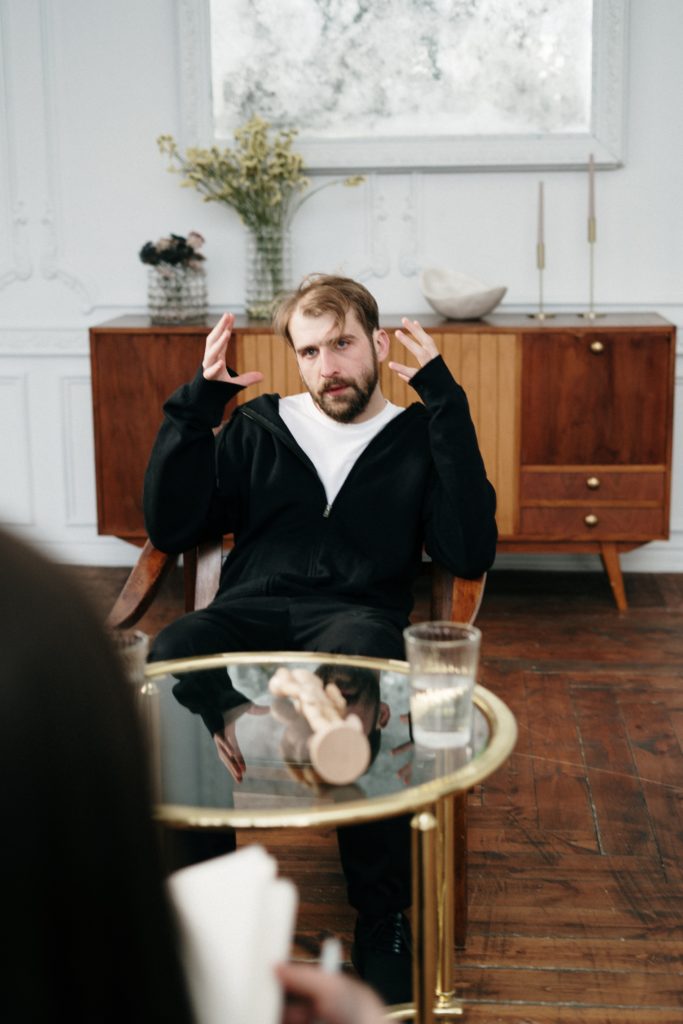Anxiety Counselling Sydney
In-person & Online Sessions Available
Speak to a highly trained Clinical Psychologist today for treatment of Anxiety
What Is Anxiety?
 Anxiety is an emotion. It is made up of thoughts, feelings, and actions. Oftentimes, we can overlook anxiety signs or not take them as seriously because it is usually not obvious that the person has an anxiety disorder. People can experience anxiety in many ways. For some, anxiety is intense and debilitating. For others, it is a slight irritant. Anxiety is one of the most common mental health conditions in Australia and it can be treated.
Anxiety is an emotion. It is made up of thoughts, feelings, and actions. Oftentimes, we can overlook anxiety signs or not take them as seriously because it is usually not obvious that the person has an anxiety disorder. People can experience anxiety in many ways. For some, anxiety is intense and debilitating. For others, it is a slight irritant. Anxiety is one of the most common mental health conditions in Australia and it can be treated.
The basis of anxiety largely stems from how we think about what happens to us rather than the events themselves.That’s what people mean when they say, “It’s not what happened to me but how I think about it.”
If you are feeling anxious in any way, it is important to know important things about people with anxiety disorders and how to overcome them.
Anxiety Symptoms
Anxiety can manifest itself in many ways. Someone may experience feelings of dread, tension, uneasiness, and irritability. They might find it hard to concentrate, sleep or relax.
It’s not uncommon for people to feel lightheaded, dizziness sick, nauseous, or shaky. Other physical symptoms include rapid heartbeat and chest pains. In addition to these symptoms, there are mental symptoms including critical self-talk, catastrophic thinking, repetitive thoughts about the anxious event/s in question, and persistent images relating to it.
There are physical, cognitive (i.e. mental) and behavioural symptoms of anxiety.
1. Physical signs of anxiety include:
- Sweating
- Trembling
- Fatigue
- Shortness of breath
- Hyperventilation
- Difficulty concentrating
- Dry Mouth
- Feeling like you’re going to die
- Choking
- Blushing
- Stomach pains and
- Diarrhoea
- Feeling spaced out or like you are not yourself
- Dizziness
- Chest tightness
- Racing heart
- Hot or cold flushes
- Reduced appetite
- Sleeping problems
- Muscle tension
2. Cognitive signs of anxiety include:
Catastrophizing – Catastrophizing involves thinking in worst case scenarios. We assume the worst will happen – even when it is unlikely. We underestimate our ability to cope with difficult things – even when we have strengths and past successes.
Worry – Worry involves dwelling on problems or things that may go wrong. This isn’t always a bad thing. It can help us to plan for things. However, the problem with worry is that it goes on and on. It exhausts us and rarely leads to actionable solutions.
3. Behavioural signs of anxiety include:
Avoidance – Anxiety motivates us to avoid a threat. This is fine when we are actually in danger and need to escape. But this is a problem when we aren’t in danger (but think we are). In addition, avoidance as a way of coping with anxiety can also limit our life.
Reassurance seeking excessively. Asking for advice and reassurance is fine. Yet if we do it too often we never learn how to do things for ourselves. Therefore this can leave us feeling inadequate and dependent on others.
Scanning for danger. It’s sensible to scan for danger in a dangerous situation. This helps us to detect and avoid a threat. However, it’s redundant in safe situations though. It can also distract us. For example, it’s pretty hard to enjoy a date when we spend all our time monitoring how we’re coming across.
Types of Anxiety
There are several anxiety disorders. Each has its own symptoms, characteristics, and severity. Diagnosing which one of these types of anxiety disorders you may have is very important in your path to recovery. Some possibilities are:
Panic disorder – panic attacks at random times. Someone with panic disorder can be thinking about their next anxiety attack at any time. Panic attacks happen at unpredictable times and can occur when the sufferer is in the middle of doing something, such as working or driving.

Specific phobia – a fear of a certain object, situation. The person’s fear is consumed by the terror of whatever they’re frightened of. This is often linked to his/her avoidance of the object, as they will do whatever they can to protect themselves from it. Avoiding it will only make the phobia worse in the long run. Sometimes, they can come across it without even knowing what they are feeling is anxiety.
Agoraphobia – an anxiety disorder in which someone gets extremely anxious about being in crowded places, public transportation, or being alone. This anxiety could lead to panic attacks.
Social anxiety disorder – a fear of being judged or embarrassed in a social situation. The person may feel as if they can’t say what is on their mind and that everyone is staring at them, even when they are alone. Another word for this is social phobia.
Obsessive-compulsive disorder (OCD) – an anxiety disorder that is related to obsessive thoughts and compulsive behaviours. Some examples include hand washing or checking things repeatedly.
Post-traumatic stress disorder (PTSD) – a person with this disorder is triggered into a state of fear and panic because they have been through a traumatic event. A common example of this is soldiers who have witnessed war.
Separation anxiety disorder – when someone experiences anxiety over being separated from people they are close to. Many with this disorder have difficulty being away from home or school.
Illness anxiety disorder – an obsession with having or getting an illness. This disorder causes someone to constantly check their body for signs of illness and repeatedly test themselves.
What Causes Anxiety?
Researchers have not been able to find an exact cause for anxiety, but many things can contribute. Some of these can be things we have no control over such as genetics and brain chemistry. In addition, environmental stressors such as a death in the family or school/work problems can increase stress levels and anxiety.
A history of trauma may also be a cause for anxiety disorders, especially when one was abused as a child or teenager. We often think of PTSD when we talk about the effects of trauma, but it can also cause anxiety disorders that affect someone for years to come.
Another important factor is how we think about things. If you have negative thoughts that create fear and doubt, it can lead to feeling anxious in certain situations.
Additionally, coping with our feelings in social situations can also play a role in being anxious. Someone who withdraws from others because they fear being judged could eventually become socially phobic.
Feeling useless or inadequate can increase stress levels and anxiety, as well as thinking that something bad will happen at any moment. Lastly, individualised weakness can also contribute to anxiety. This is when someone feels they are not good enough to face their fears and live up to the expectations of others.
There are also things you might be doing daily that could make your stress worse and lead to an anxiety disorder. These include:
- Lack of exercise
- Eating junk food on the regular
- Drinking too much coffee or soda, which can increase stress levels
- Not getting enough sleep (sleep is very important for your mental health, and being overtired will only make things worse)
- Fighting with family members daily can also be a cause of high stress while someone who is constantly thinking negatively could also make things worse
Preventing Anxiety
There are a few things that could help reduce the chance of developing anxiety:
- Exercise: a regular exercise routine can release endorphins, which boost a person’s mood and reduce stress.
- Meditation: practising mindfulness has been shown to have many health benefits, including reducing inflammation and stress levels in the body.
- Getting enough sleep: if someone doesn’t get enough sleep, they are more likely to be tired and feel stressed out. See some sleep tips here.
- Getting social support: having a supportive group of friends and family can help someone through tough times.
- Making time for fun activities: having a hobby you enjoy will help reduce stress levels and anxiety. Think of something you can do every day that will take your mind off things.
- Eating healthy food: what we put in our body directly affects how our brain functions. Eating healthy is important for reducing stress as well as preventing physical illnesses.
- Letting go of worry: if someone worries all the time, it can cause them to feel anxious or depressed. Letting go of the things we cannot control and learning not to take things personally is a sound way to prevent anxiety.
How Is Anxiety Treated?

Within anxiety counselling, Cognitive Behavioural Therapy (CBT) has been found to be effective in treating anxiety. CBT teaches people the skills to manage anxiety. Treatment usually includes:
Relaxation skills – These skills help to take the edge off the anxiety. Progressive Muscle Relaxation and abdominal breathing are the two most commonly taught techniques.
Lifestyle changes – Exercise and getting enough sleep is important. Avoiding alcohol, drugs, and stimulants like caffeine can also help with anxiety.
Thought challenging – Catastrophic thinking drives anxiety. Thought challenging helps with this. People are taught to ask, “Is this thought true?”. “How likely is that?”. “If the worst did happen, how could I cope?”.
Attention training – Anxiety gives us tunnel vision. Training your attention can help this. With practice, you can break the habit of dwelling endlessly on problems. You’ll also be more able to focus on what is important, interesting, and enjoyable in your life.
Problem-solving – CBT places emphasis on finding solutions. Using a structured approach can be helpful.
Exposure – Exposure therapy targets avoidant behaviours. People who do it are encouraged to face their fears to test whether they come true. Exposure also gives people a chance to see what they’re capable of. This is a very liberating (and difficult) treatment. It helps people take control back from anxiety so they can lead the lives they want.
This video explains how anxiety operates and how it's treated using cogntive behavioural therapy
Anxiety Counselling Sydney: Looking for Help?
Howarth Psychological Services offers anxiety treatment in Sydney CBD and surrounds. Online or in person, we can help you find the root of your anxiety and work with you to reduce your symptoms. If you or a loved one have anxious feelings, there is no need for shame or embarrassment.
Get In touch
Have a question about anxiety counselling In Sydney or not sure where to start?
Reach out, we’re here to support you every step of the way.
